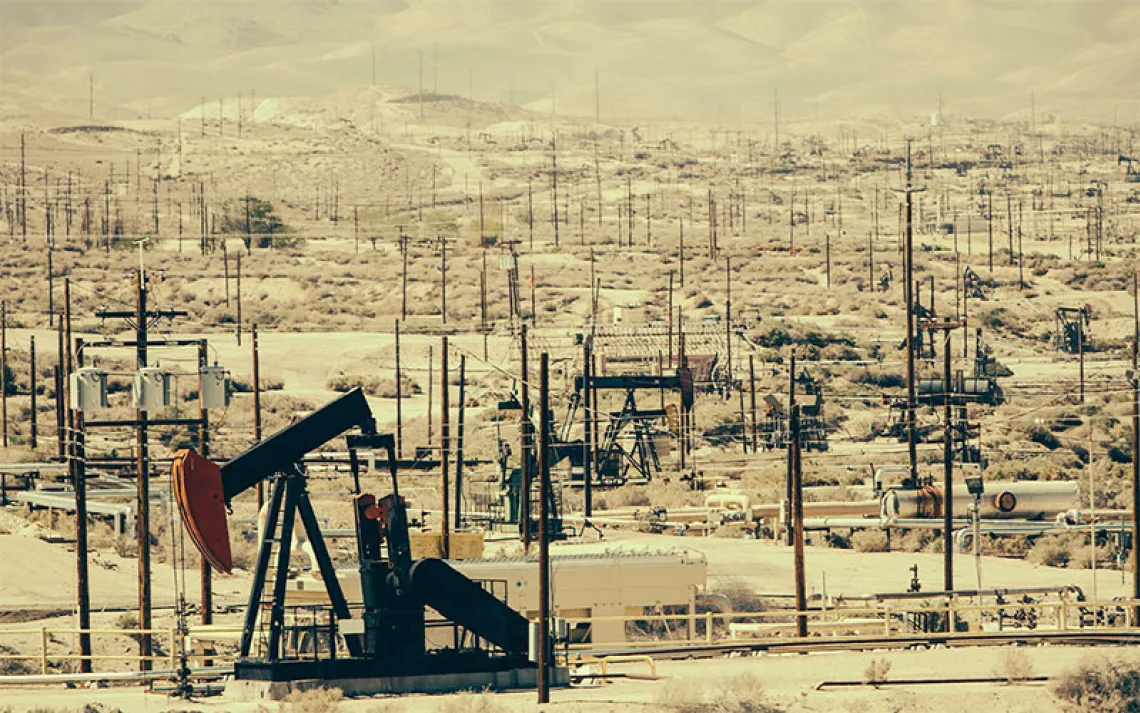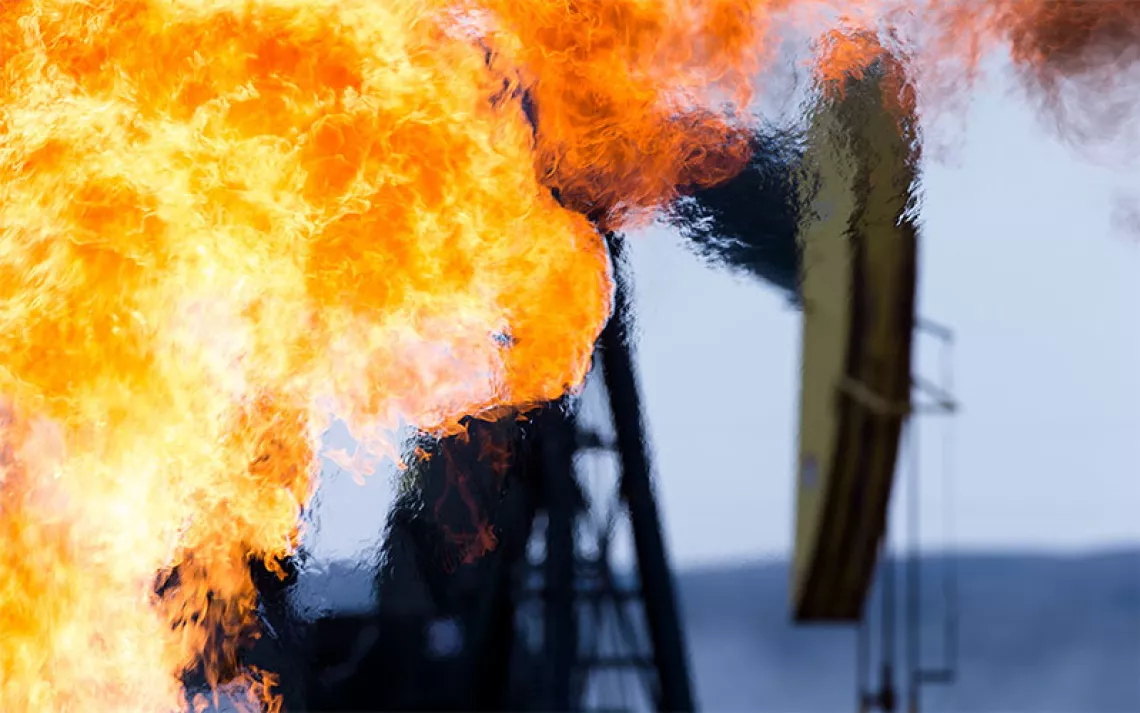Why Is the Biden White House Refusing to Confront the Oil and Gas Industry?
Environmental and Indigenous groups are increasingly frustrated with inaction

Photo by AP Photo/Gerald Herbert
Last November, the Biden administration announced that it would protect the Greater Chaco Canyon landscape in New Mexico from future oil and gas leasing. The area is culturally significant for Pueblo peoples in the Southwest, and the decision was seen as both a victory for Indigenous nations and a setback for the fossil fuel industry.
“No group of Americans has created and cared more about preserving what we inherited than the tribal nations,” Biden said when making the announcement. “We have to continue to stand up for the dignity of sovereignty of tribal nations.” He billed the move as a win for Indigenous communities and for the fight against climate change. The New York Times described the executive order as an element of the administration’s “ambitious climate agenda.”
Just two days later, however, the Biden administration held a large auction for new oil and gas leases in the Gulf of Mexico. The lease sale had been ordered by a federal judge, who earlier in 2021 had ruled that the administration hadn’t followed the law in pausing oil and gas sales. Nevertheless, environmentalists were dismayed. Earthjustice called the lease sale a “huge climate bomb.”
The contradictory moves—blocking oil and gas development in one area but greenlighting an expansion in another, even if under judicial duress—exemplify President Biden’s approach to climate change in his first year in office. While he has made some important steps to cut US greenhouse gas emissions, his administration's reluctance to directly confront the oil and gas industry is becoming increasingly apparent, according to environmental and Indigenous groups.
“They can't have it both ways. They can't talk about climate and then commit massive amounts of new fossil fuels in the face of a climate crisis,” Taylor McKinnon, senior public lands campaigner at the Center for Biological Diversity, told Sierra. “They're plagued by a lack of climate ambition at the highest levels of the administration.”
During his first days in office, Biden canceled the Keystone XL Pipeline and directed the Department of the Interior to pause oil and gas leasing on federal lands while it undertook a comprehensive review of the programs. Those moves signaled that climate change would be a central theme to the Biden era.
In April, Biden held an international summit with global leaders, during which he announced a new emissions target—the United States would aim to cut emissions by 50 to 52 percent by 2030. The announcement also nudged other countries to ratchet up their ambition.
During the summer, the Department of Treasury pushed multilateral development banks to end overseas financing for most fossil fuel projects, and this past fall, the EPA announced new regulations on methane emissions from the oil and gas industry. Right before Christmas, the EPA unveiled tough new fuel economy standards for cars and trucks—an especially important move, given that transportation is the largest source of US greenhouse gas emissions.
Despite these moves, Biden’s climate record to date has been more piecemeal than transformational. The White House is not yet employing all of the levers available to the executive branch to tackle the climate crisis. So far, the Biden administration appears to be prioritizing the easy actions while avoiding moves that could antagonize political enemies—like the powerful oil and gas industry.
For example, Biden has remained silent on a long list of projects that environmental groups, Indigenous communities, and other local grassroots movements have pressed him on. Biden took no position on the Line 3 Pipeline, even as Indigenous water protectors and allies disrupted construction of the tar-sands-related project and faced arrest by Minnesota state police. Biden has said nothing about the Line 5 Pipeline, despite the fact that a dozen Indigenous nations in Michigan, along with a coalition of environmental justice organizations and the Democratic governor of Michigan, seek the pipeline’s closure.
In spring, a federal judge gave the Army Corps of Engineers, which is under the administration’s control, multiple chances to request the shutdown of the Dakota Access Pipeline in light of the fact that the pipeline is operating without a valid easement. Instead, in April, the corps stuck with the Trump administration’s policy and allowed the contested pipeline to continue to operate.
Last summer, the Interior Department suspended leases in the Alaska National Wildlife Refuge. But at the same time, the Department of Justice defended the Willow project in Alaska, a massive oil development led by ConocoPhillips (a federal court later shot down permits for the project).
There does not seem to be an overarching philosophy that explains why the administration takes action in one area and not another, other than what appears to be a desire to avoid serious confrontation with the oil industry. “They pick and choose the things that are going to be the easiest,” Joye Braun, the national pipelines campaign organizer with the Indigenous Environmental Network, told Sierra.
She pointed to the recent protections for Chaco Canyon. “While that is extraordinarily important and a decades-long fight for the tribes down there, it doesn't do anything for the tar sands that are moving through Line 3. And it doesn't do anything for the replacement of Line 5 or the building out of Mountain Valley [Pipeline]” in Appalachia, she said.
Braun praised the Biden administration’s cancellation of Keystone XL and his appointment of Deb Haaland, a member of the Laguna Pueblo, to lead the Interior Department. Braun also said the White House has listened, at times, to Indigenous voices, which was a departure from the previous administration.
But beneath a lot of the rhetoric, there is plenty of continuity with the business-as-usual approach of past administrations. “Trump was just very overt: ‘We're going to do all this extraction, and we're going to do all this damage, and there's nothing you can do about it.’” Braun said, summing up Trump’s approach. “Biden is being sneaky.”
When asked how Braun would describe the Biden administration’s approach to Indigenous peoples, she responded, “paternalistic.” In communications with the White House, Braun said that Biden officials point to their accomplishments on climate change and question why Indigenous communities and other activists are still criticizing them. “I'm not going to sit there and play the good little Indian,” she added.
“There is a story in the Lakota tradition called Double Faced Woman. I liken [Biden] to her,” Braun said with a chuckle. “She’s not a good character.”
For some environmental advocates, a clear example of the administration’s allergy to tough decisions came in late November when the Interior Department released its highly anticipated review of the federal oil and gas leasing program. Instead of ending new oil and gas leases on public lands and waters—as many environmental groups had hoped and Biden himself promised on the campaign trail—the report merely called for higher royalty rates and recommended not leasing in sensitive areas. In other words, there would be no meaningful change to the fossil fuel bonanza on public lands.
The report barely mentioned climate change, and the fact that it was released on the Friday after Thanksgiving struck many as an admission on the part of the administration that it was retreating from its promises and was hoping to avoid a negative news cycle. The Center for Biological Diversity called it “flimsy.” Earthjustice said, “We expected much more, especially given the Biden administration’s deeply disappointing and legally avoidable Gulf lease sale.”
The reluctance to phase out oil and gas drilling on public lands is especially problematic since it resides in a legal area where the president has strong executive authority to act and doesn’t need Congress, according to Erik Schlenker-Goodrich, executive director of the Western Environmental Law Center.
“I think what's concerning to me, especially relative to fossil fuel production, is the unwillingness of the administration to deal with that supply side,” he told Sierra. “You can't avoid taking a position on this. They seem to be avoiding taking a position on it, and they're just pissing everybody off.”
“If you take a look at all the peer-reviewed science out there about how we align our country's greenhouse gas emissions trajectory ... you need to have a decline in oil and gas production,” Schlenker-Goodrich said. The oil and gas industry “is probably laughing internally” at the call for higher royalty rates, he added, which would have very little financial impact on the industry and would do little to slow the pace of leasing and drilling.
“It just suggested that the administration's ambition and capacity to run the gauntlet with the oil and gas industry is not there. That they seem unwilling to actually confront the power of the oil and gas industry,” Schlenker-Goodrich added. “They're approving drilling permits at a rate faster than the Trump administration.”
The Biden administration is staking much of its climate legacy on the $550 billion in funding for renewable energy, electric vehicles, and other climate programs in the Senate-stalled Build Back Better Act. Experts say that the shift to renewable energy will accelerate substantially if Democrats succeed in passing that legislation into law. By any measure, it would be a major achievement—if only it can get beyond the stalemate in the Senate.
But heavy investments in renewable energy are not enough on their own, especially with the oil and gas industry still eyeing growth.
"Tackling the climate crisis requires both major investments in clean energy and an immediate halt to the expansion of fossil fuels—not one or the other,” said Athan Manual, director of the Sierra Club’s Lands Protection Program. “President Biden has made it clear that he understands the need for this all-hands-on-deck effort, but that understanding still needs to be matched with ambition to make it a reality."
 The Magazine of The Sierra Club
The Magazine of The Sierra Club



